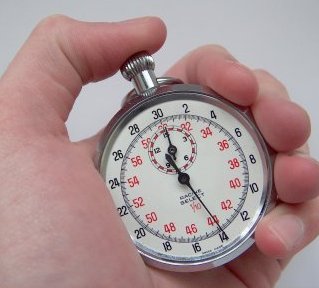
Over the last several weeks, we have covered a number of skills and habits that successful students utilize to stay at the top of their game, academically and personally. The academic skills and habits and the use of planning and time-management are obvious to most students and parents and therefore are part of any family’s conversation about student performance and happiness. Yet, there is one skill that is less obvious to many and it might be the most important skill that a student can develop. That is the skill of accurately gauging the amount of time needed to complete each obligation and desired outcome that a student is committed to.
A student can plan his or her week in great detail and lay out a perfect schedule for preparation and study, fun, relaxation, and engaging activities, but if he or she does not accurately gauge the amount of time needed to complete the planned tasks, then the beautiful plan is a complete waste of energy. I find that student productivity and happiness is most frequently constrained by vagueness about the specific tasks to be completed. Few students make clear plans as to when and where a task will be completed. Critically, most students do not pay close attention to how much time a task actually takes to be completed.
When I ask students about their homework plan for a specific night or week, I frequently hear a response such as:
 “I want to prepare for my English test on Tuesday.”
“I want to prepare for my English test on Tuesday.”
“I will complete my Pre-Cal homework tonight.”
“I need to read and take notes on the upcoming chapter in my U.S. History textbook by Sunday.”
Some of these responses are at least specific as to what exact task needs to be completed, but they suffer from the failure to specify how long the task will take to complete. When a task exists as an open blob of time, it is less likely to be completed and more likely to take longer than needed to complete. If I give myself until Sunday to read and take notes on my U.S. History text, then I will likely allow the task to expand to that amount of time. Remember Parkinson’s Law! This is the nature of our minds and behaviors as humans. We are natively quite efficient at completing specific tasks within a timed framework (think of an assembly line or a professional sports practice session), but less structured time tends to lead to inefficiency, distraction, and procrastination.
Every task needs details about what is to be done, when and where, and how long to completion
Every task needs a home and part of creating a home for the task is defining exactly what is to be done, when and where it will be done, and how long it will take to complete. Successful students are well-aware of this problem and thus adjust their awareness and their plans in order to work around it. A successful student pays close attention to the details of how their time is spent and thus can reasonably estimate how long a specific homework assignment takes to complete. For larger, multi-step projects this becomes even more crucial. Preparing for a test or writing a paper will likely require multiple tasks in order to appropriately complete the whole shebang. Properly defining each task, including details about what to do, where to do it, when to do it, and for how long, significantly increases student success and efficiency.
 If you have not fully grasped the subtlety of this skill, allow me to spell it out in more detail. A task that is left vague is an open and undefined loop in one’s mind. When one says, “I need to complete my History test preparation today after class,” there are many ways to foul this up. If I arrive home from class at 4pm with the task of history test prep in my mind, I may have a fairly clear idea of the steps needed to complete the task. More likely, I may be quite unclear about exactly what is needed to complete the task. The “unknowns”: which steps to take, when, in what order, and for how long. These unspecified details cause an increase in my anxiety and my tendency to procrastinate. An undefined task is like a giant blob that rests upon my shoulders and therefore makes my heart beat faster and my life more difficult. My resistance to facing the task is proportional to the degree to which it is undefined.
If you have not fully grasped the subtlety of this skill, allow me to spell it out in more detail. A task that is left vague is an open and undefined loop in one’s mind. When one says, “I need to complete my History test preparation today after class,” there are many ways to foul this up. If I arrive home from class at 4pm with the task of history test prep in my mind, I may have a fairly clear idea of the steps needed to complete the task. More likely, I may be quite unclear about exactly what is needed to complete the task. The “unknowns”: which steps to take, when, in what order, and for how long. These unspecified details cause an increase in my anxiety and my tendency to procrastinate. An undefined task is like a giant blob that rests upon my shoulders and therefore makes my heart beat faster and my life more difficult. My resistance to facing the task is proportional to the degree to which it is undefined.
Even clearly defined tasks may not lead to desired results
It may be that there is but one step required to properly complete my test preparation. I may have that step clear in my head. For example, I know that I need only review my history notes from chapters 1 to 4 to be properly prepared for my test. Yet, even with a defined specific task in mind, I am likely to make that task more difficult than it needs to be if I do not quantify the time needed to complete the task. Giving myself a defined task and a specific deadline is better than the alternative, but not a cure-all.
If, I arrive home from class at 4pm and guess that my test preparation will take about an hour or so, I thus allow myself to relax, watch a few hours of Netflix, eat dinner, and send some Snapchats. I wake up from my haze and find that the clock now reads: 9pm.
Given that my history preparation task is to review my notes, I know exactly what I need to do. However, I find that I had not done enough pre-work nor been honest with myself as to how long the task of preparing will actually take. I came home from class with an unquantified guess that I needed 1 hour of notes review, but the task in actuality requires double or triple the amount of time. At 9pm, my productivity and attention is not at a high level and the task requires more time than the 1 hour that I guessed. Studying might have required 2 hours, if done at 6pm, but now requires 3 hours because of my increased fatigue and impaired cognition at this time of night. And even though I do the 3 hours of notes review, I may still not perform well on the test because I have created unnecessary stress and anxiety that will likely harm my recall and cognition.
A successful student does not leave tasks unquantified! I need to get good at estimating how long tasks take to complete, so that I may allocate appropriate resources to the task. If I have found that a usual effort for history test prep is 2 hours, then I need to be honest with myself that this is the amount of time that is needed to complete the task. If I cannot estimate the needed time to properly prepare for a history test, then I need to start measuring how long it takes, on average. Whatever the length of time needed to complete the task, I can appropriately plan and respond to that requirement.
I complete tasks by defining them with as much detail as possible, including time needed for completion
With appropriate foresight and honesty with myself, I would have had no problem properly preparing for my History test. After all, I arrived home from class at 4pm with only 1 task for the night! Yet, even though I was specific about the task to be completed (review History notes), I failed myself because I did not specify how long the task required and did not allocate appropriate time to the task. These small but subtle mistakes are the hangnails that bring down giants.
To achieve at one’s true abilities, at school, in one’s personal life, or on the job, it is the details that make the  difference. With increased attention and honesty, I can get good at accurately gauging how long tasks take for completion. In doing so, I will be better at allocating my time, achieve better results, and make my life easier and more peaceful.
difference. With increased attention and honesty, I can get good at accurately gauging how long tasks take for completion. In doing so, I will be better at allocating my time, achieve better results, and make my life easier and more peaceful.
